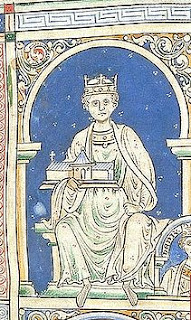by Christy English
Henry II fought throughout his reign to consolidate control into the monarchy's hands and to extend the king's peace.
When he took the throne in 1154, England had been at war for almost two decades as Stephen the Usurper and Mathilda of Normandy fought for the English throne. It was Henry II who at the age of nineteen finally settled this question, defeating Stephen in a decisive battle during the same summer when Stephen's son and heir died of a fever.
Needless to say, during the twenty years of civil war, the king's peace was more than broken. It was crushed, along with many villages, people, and crops. By the time Henry II took the throne in December of 1154, England was desperately in need of the king's peace. At first, this peace only extended to the room the king was in: if you drew your sword in anger in the king's presence, your life was forfeit.
During Henry II's reign, for the first time since the Norman invasion, the king's peace began to extend beyond his presence. Henry worked to make sure that if the king's peace was broken anywhere in England, secular law would deal with the culprit. This was seen as power-mongering among his barons, but for the peasants of England, the king's peace meant that if someone was raped or killed or brutalized, they or their loved ones had legal recourse.
Henry II's famous conflict with Thomas Becket stemmed from this concern over the rule of law. When Thomas was Henry's chancellor, he worked along with him to strengthen law in England. But once he was made Archbishop of Canterbury, his loyalties were with the Church, and Rome.
When a priest, even a layman, committed a crime, he was not charged in the secular courts but in an ecclesiastical one. This meant that any priest could rape or kill with complete impunity, because often ecclesiastical courts chose to look the other way when dealing with errant priests.
Henry II fought long and hard over this issue, but his work hit a setback with the death of Thomas Becket in December of 1170. As difficult at the unruly archbishop had been, once Becket was martyred, Henry lost the moral high ground. Forced to do penance for Thomas' murder in 1174, Henry spent the rest of his reign fighting his sons for control the empire he had built.
In spite of the end of his reign, Henry II did the most of any other Norman king to further the rule of law in England. We remember him most for his family conflicts, but perhaps we should remember him for his love of the law instead.
~~~~~~~~~~~~
~~~~~~~~~~~~
Christy English is the author of The Queen's Pawn and To Be Queen, novels about Eleanor of Aquitaine as well as the Regency romances How to Tame a Willful Wife and Love on a Midsummer Night. For more about the early Plantagenets and Regency romance fun, please join her on her website Working with the Muse



Interesting take on Henry's reign! Thanks!
ReplyDeleteEven today the Catholic church prefers to "disclipine" errant clergy rather than hand them over to civil authorities (i.e., sexual abuse by priests and physical abuse by nuns). There is nothing new in the world. Henry II was ahead of his time.
ReplyDeleteI agree , Wanda Sue. He was indeed. Thanks for commenting Sophia Rose :)
ReplyDelete